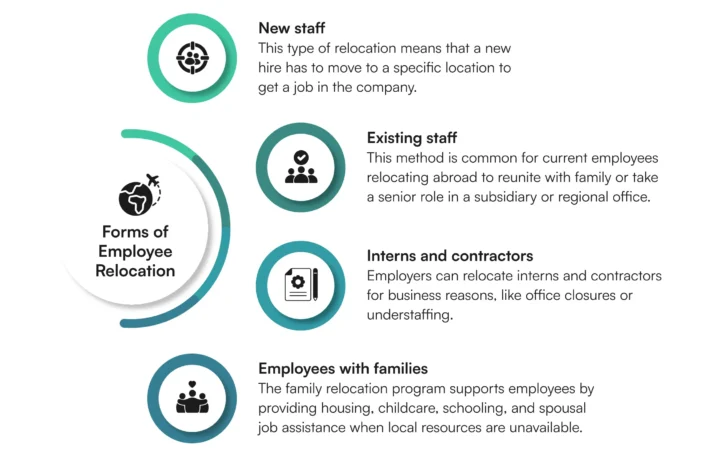The contemporary workforce and business are highly mobile. Businesses move to a new location for economic reasons, such as a more attractive target market or favorable taxation, or have their staff relocate from one country to another because of changing work conditions and requirements.
The process of relocation for work is often technically and legally challenging. Thus, it requires proper planning and preparation, as well as consulting with third-party relocation professionals to ensure a smooth move of people or business operations. Here is a detailed guide to managing employee relocation like a pro.
What is Employee Relocation?
By definition, employee relocation means that an employee is moved to another city, state, or country for a business purpose. As a result, the employee remains within one company and changes their place of work and living to perform their functions for the employer. As a rule, employers offer tangible relocation benefits for employees to incentivize their move, such as a pay rise or a career advancement. The transferee may remain in the same job position or take on a new role in the company in a new location.
Relocation can take several forms in practice:

- New staff. This type of relocation means that a new hire has to move to a specific location to get a job in the company. It may be an outcome of international hiring efforts, during which the HR staff look for properly qualified specialists and give them a lucrative job offer for in-house employment.
- Existing staff. This method is common for current employees who want to move to another country to reunite with family members or fill a senior position in the company’s subsidiary or regional office. It may also be arranged when a business is expanding and entering a new market and needs an experienced core team from the head office.
- Interns and contractors. At times, employers can relocate their temporary interns and independent contractors for business reasons, such as closing a regional office or filling an understaffed position.
- Employees with families. The family relocation program is implemented when employees resist a move because of the absence of local possibilities and resources for their family members. In this case, the employer assumes responsibility for family housing, childcare and school enrolment, as well as employment support for spouses.
Importance of Staff Relocation in Business
Employee relocation is at the heart of flexible and quick hiring for many businesses. The main benefit employers reap from relocating staff is their ability to fill a highly specialized vacancy or move qualified, experienced staff to regional offices without lengthy and costly local staff hiring. By assuming responsibility for the transferee’s expenses, a company can attract the right talent literally from any corner of the globe.
Another advantage of offering a relocation package to staff is the ability to solve interpersonal conflict problems without losing key talented employees due to workplace tension. This way, an employer can retain all core staff without the need to make hard choices.
Components of a Typical Relocation Package
Let’s take a look at what corporate relocation packages typically include to see how you should arrange this aspect of cross-border staff management. There is no one-size-fits-all relocation package, and terms are usually company-specific. Yet, the standard approach presupposes the following:
- Travel expenses. Since the employee moves to another location on the employer’s initiative, it is the company that pays for all travel expenses. The employer should purchase tickets and cover associated costs in the relocation package.
- Relocation logistics. Moving a house is pretty costly and resource-consuming, so the employer may help their transferees by providing a moving team. These experts should perform all the packaging, moving, shipping, and storage work in line with professional standards of safety.
- Temporary housing. It is common to cover 1-2 months of temporary housing for the employee in a new location within the relocation package. This period is usually enough to find a permanent rental property or purchase housing and settle on a permanent basis.
- Paid time off. While the employee is traveling and settling in a new place, they will hardly have an opportunity to work full-time and at a regular pace. Thus, many employers offer several weeks of paid time off for a smooth relocation.
Legal Aspects of the Relocation Process
As soon as you organize the new or existing employee move to another country, you will have to plan everything thoroughly, especially the legal side of the relocation. The main aspects to consider are:
- Visas and work permits for all employees.
- Local labor laws and employee classification requirements.
- Taxation and tax compliance nuances.
- Social security contributions.
- Proper documentation for spouses and dependents moving together with the relocating employee.
Challenges of International Relocation
It takes time and effort to relocate your company staff, so you should be ready for certain challenges on the way. The main bottlenecks a typical employer comes across in the process of employee relocation are as follows.
High Expenses
Corporate relocation costs are always high, regardless of where you move your staff and business operations. The company needs to cover at least 30 days of temporary living experiences for the transferees, storage of their household items before settling in a permanent apartment, tickets for the employee and their family, etc. Some employee relocation packages also cover assistance with spousal employment, coverage of childcare costs, and school enrolment help. Therefore, it’s always a considerable investment on the employer’s part.
Resistance to Change
Not all people are ready to appreciate employee relocation benefits, as many want to stay in their homeplace. Resistance to change is part and parcel of human nature, with some age groups being less open to relocation. For instance, the 2022 survey by Allied found that young employees aged 25-34 years old are the most open to relocation, with 37.25% of the surveyed sample agreeing to move to another country for job prospects. Staff aged 35-44 years old were already much less eager to move, with only 23.78% of surveyed people agreeing to relocation. The number of staff favoring a relocation naturally reduced with age, showing that some employee categories may be much harder to relocate.
Legal Compliance
If you’re targeting international employee relocation, the procedure should be arranged in line with local labor laws, taxation, work permits, and visa requirements for every relocating person. Therefore, it’s vital to do your due diligence, study the legal landscape of the new location, and engage a team of legal experts who may advise and guide you in the process.
Housing Assistance
As a rule, it is the employer’s responsibility to find and rent housing for their relocating staff, at least for the first couple of months, in the new country or city. The process requires additional investment and human resources for making all rent arrangements, and the search for suitable housing options may be complicated in high-demand, expensive locations.
Family Move
It’s much easier to relocate single employees who have no spouses or children and are much more mobile. However, the situation is not always so ideal, so businesses often have to factor in the family move along with their employee’s relocation. This relocation package may come with added business expenses, housing costs, and visa arrangements, thus complicating the process.
Staff Retention
Staff often wrongly perceive relocation as a threat to their job stability and career progression. Refusing to relocate may result in a layoff, so they lose trust in their employer and leave the company in search of more sustainable employment options. This way, your business’s relocation plans often put staff retention under strain.
Repatriation
Many work relocation arrangements are temporary. They don’t presuppose that a person will stay in the target country forever. That’s why businesses that relocate employees need to be transparent about the duration of that appointment, the person’s career progression prospects, and their employment perspectives upon return home.
The Cost of International Staff Relocation
On average, according to Rippling experts’ estimate, the cost of an employee relocation package ranges from $20,000 to $100,000, depending on the target location and the need for family support services. Therefore, it’s a costly investment for any business that requires proper planning and a thorough cost-benefit analysis. If the relocation is unavoidable, you should consult a qualified provider of such services to develop a reasonable strategy and offer an attractive package to your staff.
Benefits of Using Third-Party Relocating Services
If you find the process of employee relocation too burdensome or confusing but still need to move your staff across borders, it’s worth considering third-party relocating services. By partnering with an experienced employee relocation company, you can relieve the burden of arrangements and receive turnkey solutions for moving your staff.
The benefits of using professional staff relocation services are as follows:
- Developing an effective employee relocation policy. Providers of employee relocation services can help you develop a custom-tailored strategy that will take into account your company size, budget, the number of relocating staff, and the costs and responsibilities you should cover.
- Implementing best relocation practices. By working with professionals, you will receive end-to-end company relocation services, starting from a detailed pre-move consultation with needs assessment and cost estimation and ending with the arrangement of all paperwork and logistics.
- Ensuring legal compliance. Both business and staff relocation come with lots of paperwork and legal arrangements, such as visas and work permits. The company should guarantee its operations’ compliance with local labor laws and taxes. It is also vital to make social security contributions in line with local legislation. An employee relocation assistant can handle all this documentation and make your move legally safe.
- Raising staff satisfaction. A professional service provider is sure to make staff more satisfied with the logistics and coordination of relocation. All these aspects make the relocation process smoother and contribute to staff buy-in.
- Relieving the burden from the core staff. If the employee relocation program is developed and implemented by the company independently, the full scope of responsibilities remains on the shoulders of HR staff. This task may be too challenging for HR managers inexperienced in relocation, thus creating an additional burden on the department and distracting the employees from their main responsibilities. Outsourcing this job to a third-party provider is a wise solution for businesses wishing to avoid straining their in-house human resources.
- Experience and expertise. Companies specializing in job relocation services, such as GEOR, are highly experienced in managing all aspects of the relocation process. From cultural adaptation to housing support and family integration, such businesses can offer tangible support at all stages of business move. Ongoing employee support, visa and work permit consultations, and business continuity planning are all part of the relocation service, which can aid your business operations significantly.
Manage Your Staff’s Relocation with GEOR
If you’re planning an international relocation and want a reliable and experienced helper, GEOR can become your go-to provider of relocation services. From staff relocation to moving the entire business to another country, we have experts who can make the move smooth and non-demanding for you. GEOR covers 100+ countries with a legal presence and an in-depth understanding of local labor laws, taxes, and work permit requirements. Therefore, we can design a custom-tailored strategy that will give you a sure head start in a new location.
Contact GEOR experts to guarantee a smooth business
move or staff relocation to 100+ countries. We can handle
all paperwork and organize the practical side of relocation
logistics to let you enjoy the process.

